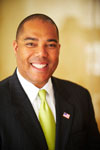
Americans for the Arts
Congressional Arts Staffers: Your Partners in Change for the Arts
Posted by Mar 08, 2012

Americans for the Arts
For 25 years of the Congressional Arts Caucus¹ 30-year history, arts advocates have convened for one day on Washington, D.C.'s Capitol Hill to flood the halls of Congress to share their views regarding arts initiatives.
On this day, such active engagement by the arts community provides our representative government with a first-hand account of the state of the arts in our country. The opportunity to meet with our constituents and businesses with a personal connection to the arts helps to put a face (and a talent) to the idea of supporting the arts at a federal level.
Arts Advocacy Day (AAD) is a day to celebrate the vibrancy of the arts and the wide array of talents here in the United States of America. There is no better place to embrace the great diversity of our country’s artistic identity than in the nation’s capital.
For the thousands of you who have participated in AAD, chances are you have met with a congressional staffer or two (or 435). As the staff members that manage the Congressional Arts Caucus on behalf of its Co-Chairs, believe us when we say these meetings have a tremendous effect on gaining the attention of your Representatives and help to keep the arts community in the Members’ thoughts throughout the year.
Because of this, arts staffers are your greatest allies in making positive change for the arts with federal investments.
Read More









